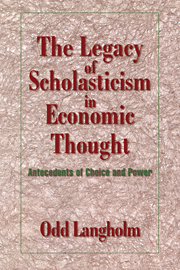Book contents
2 - The Roman law tradition
Published online by Cambridge University Press: 13 March 2010
Summary
The legal approach
Medieval Latin Aristotle commentators, discussing acts done through fear, would alternate between Grosseteste's timor and the technical term metus of Roman law. Albert the Great and Thomas Aquinas, as well as such later commentators as Buridan, would distinguish between different degrees of external compulsion, one decisive criterion being whether the threat was such as to frighten a “courageous man,” a “man of character” (vir constans). This man of character is a Roman law exemplar. When the new translation of the Nicomachean Ethics appeared in the middle of the thirteenth century, law was a firmly established academic discipline, just like theology, and the interchange of terms and ideas with Aristotelian philosophy started to flow immediately. It is particularly striking in the writings of Albert the Great, the doctor universalis. In his first commentary, Super Ethica, there is a series of replies to objections drawn from legal texts against Aristotle's concept of a mixed will. They are mostly of a terminological character, but one of them goes to the substantive core of the two disciplines, whose ideas about compulsion and the voluntary are to be the subjects of this and the following chapter. It can serve as an introduction to the present one and as a preview of the next.
According to law, Albert remarks, force and fear (vis et metus) excuse completely, for (quoting the Digest) that which is done through force or fear will not be upheld in law. If such acts are similar to voluntary acts (as Aristotle claims), however, there is no excuse; hence it seems that Aristotle is in error. To this, Albert replies that fear remits all loss but not all shame.
- Type
- Chapter
- Information
- The Legacy of Scholasticism in Economic ThoughtAntecedents of Choice and Power, pp. 30 - 42Publisher: Cambridge University PressPrint publication year: 1998

